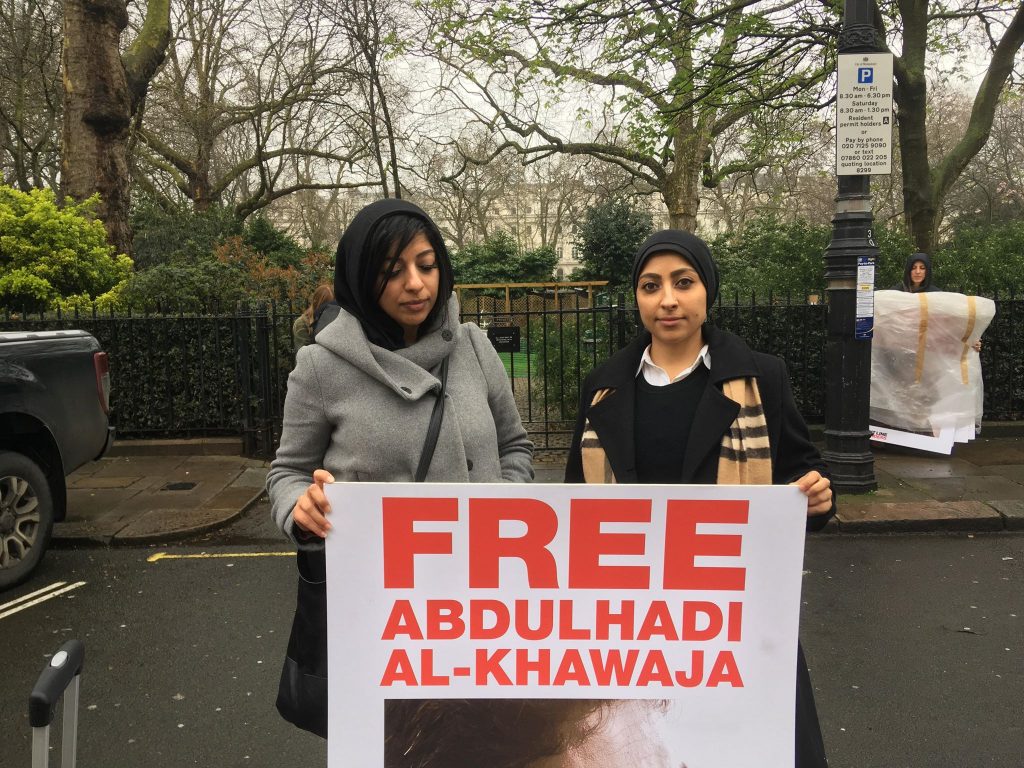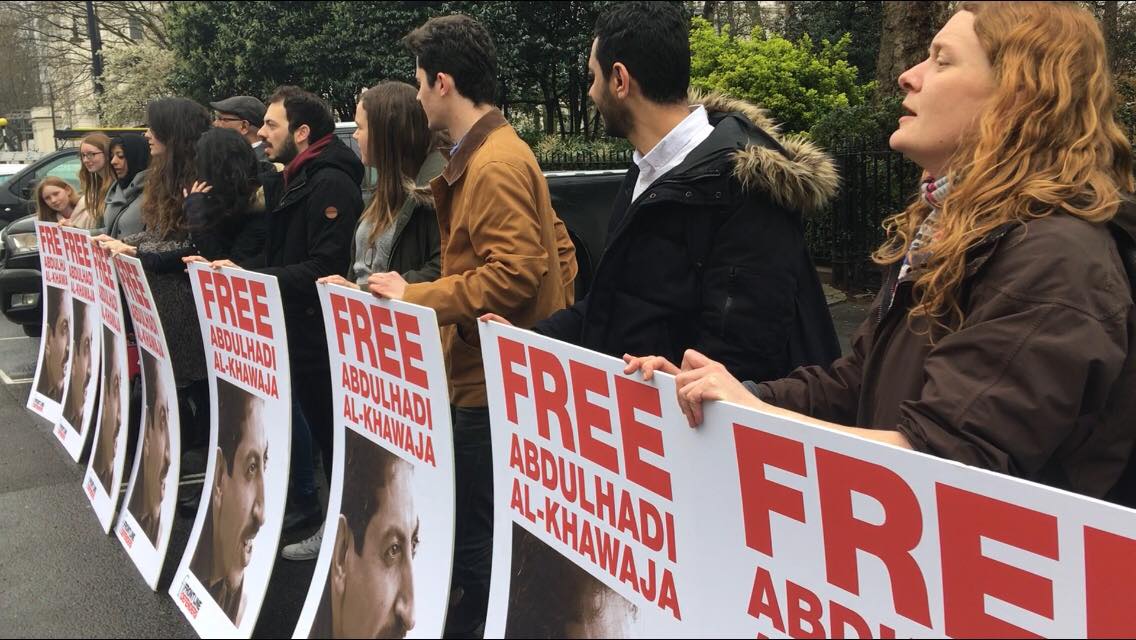10 Apr 2018 | Bahrain, Bahrain News, News and features
[vc_row][vc_column][vc_column_text]By Ciaran Willis, Lauren Brown and Samantha Chambers

Zainab and Maryam al-Khawaja
The daughters of Abdulhadi al-Khawaja, the co-founder of Bahrain Centre for Human Rights, participated in a demonstration on Monday 9 April outside the Bahrain Embassy in London calling for his release on the seventh anniversary of his arrest.
Maryam and Zainab al-Khawaja joined NGOs and fellow supporters, as they chanted “free free Abdulhadi” and held placards with a picture of the Bahraini human rights activist.
It marked seven years since Abdulhadi al-Khawaja, founder of the 2012 Index on Censorship Freedom of Expression Award-winning Bahrain Centre for Human Rights, was imprisoned for his involvement in peaceful pro-democracy protests that swept the country during the Arab Spring. On 9 April 2011 twenty masked men broke into his house, dragged him down the stairs and arrested him in front of his family.
Bahrain has a poor track record on human rights, with many reports of torture and human rights defenders in jail. Al- Khawaja was part of the Bahrain 13, a group of journalists and activists who faced unfair trials following the unrest.
During his time in prison, Al-Khawaja has been tortured, sexually abused and admitted to hospital requiring surgery on a broken jaw.
His daughter Maryam al-Khawaja was imprisoned in Bahrain for a year before leaving the country in 2014. She faces prosecution on charges including insulting the king and defamation. She told Index: “For me, this isn’t just about my dad, it’s a reminder that we have thousands of prisoners in Bahrain, and we need to remember all of them, and we need to be fighting on behalf of all of them. These are all prisoners of conscience.”
A number of prominent Bahraini campaigners took part in the demonstration.
Jawad Fairooz, a former Bahrain MP and president of SALAM for Democracy and Human Rights, said: “We’re here to support Abdulhadi as a symbol of the demand of the people of Bahrain who want to live in the country with dignity and freedom.”
Sayed Ahmed Alwadaei, director of advocacy at the Bahrain Institute for Rights and Democracy and an activist who fled the country following torture, said: “I’m proud to belong to a nation that Abdulhadi is a part of. Abdulhadi to me is one of the most inspirational individuals.”
Cat Lucas, programme manager at English Pen’s Writers at Risk initiative, said that the government could be doing a lot more to challenge what is going on in Bahrain. She hopes the Bahraini Embassy will finally act, not just in the case of al-Khawaja, “but in the case of lots of writers and activists who are imprisoned for their peaceful human rights activities”.
Protesters have gathered outside the Embassy once a month since January 2018 to highlight the dire human rights situation and ask the UK government to take action.
Al- Khawaja’s daughter Zainab called on the UK to hold the Bahraini regime accountable: “Major governments are still supporting the Bahraini regime with weapons and political training. They’re the people behind them. I can feel as angry here as I would protesting in Bahrain, because I know what the government here is responsible for. I know one of the reasons people are being killed and tortured in Bahrain, including my father, is the support from the British and American governments.”
A group of NGOs, including Index on Censorship and Pen International, signed a letter last week calling on Bahrain to cease its abuse of fundamental human rights.They asked the authorities to immediately and unconditionally free Abdulhadi, provide proper access to medical care and allow international NGOs and journalists access to Bahrain.[/vc_column_text][vc_video link=”https://www.youtube.com/watch?v=8lkS7Fsyqso”][/vc_column][/vc_row][vc_row][vc_column][vc_basic_grid post_type=”post” max_items=”12″ style=”load-more” items_per_page=”4″ element_width=”6″ grid_id=”vc_gid:1523361455279-ef10ef07-647f-1″ taxonomies=”716″][/vc_column][/vc_row]
10 Apr 2018 | Bahrain, Bahrain News, Uncategorized
[vc_row][vc_column][vc_column_text]
In 2011 Bahraini human rights defenders were arrested for pro-democratic activism. Seven years on, monthly protests are reminders of ongoing injustice.

Protesters gathered outside the Bahrain Embassy shouting “free free Abdulhadi” as activists continue to be targeted
NGO’s gathered yesterday at the Bahrain embassy in London to call for the release of Abdulhadi al-Khawaja, a human rights defender imprisoned for life seven years ago for organising peaceful protests against Bahrain’s government during the country’s Arab Spring uprising.
Al-Khawaja founded the Bahrain Centre for Human Rights in 2002 and is a founding director of the Gulf Centre for Human Rights, established in 2011. He was one of 13 human rights defenders to be arrested during the 2011 demonstrations.
Index on Censorship and other human rights organisations have called for his immediate release and for all human rights defenders jailed in Bahrain to be freed.
Monday’s protest not only signalled the ongoing persecution of al-Khawaja, but with repeated calls for his release, highlight Bahrain’s systematic imprisonment and targeting of human rights activists since the Arab Spring.
Front Line Defenders recently reported that all human rights defenders in Bahrain have been exiled, imprisoned or prevented from freely working or travelling. Here, we profile some of those targeted:
Nabeel Rajab
This human rights defender was imprisoned for five years in February 2018 for tweets and retweets perceived as inflammatory by the Bahraini authorities. The posts, from 2015, relate to torture in Bahrain’s Jau prison and the killing of civilians. He has been in and out of prison for peaceful human rights activism since 2012, with charges ranging from “incitement to non-compliance with the law” and “spreading false news” to “incitement to hatred against the regime”.
Nedal Al-Salman
Head of women and children’s rights advocacy for the Bahrain Centre for Human Rights, Al-Salman was stopped at Bahrain International Airport in December 2017. She was prevented from travelling and has since been banned from leaving the country. The same happened in 2016 when she was barred from exiting on her way to attend the United Nations Human Rights Council in Geneva. In April 2017 Sharaf Al-Mousawi was also stopped on her way to a development meeting in Lebanon.
Ebtisam Al-Saegh
Al-Saegh, who works for Salam for Human Rights and Democracy, was one of 22 human rights defenders who were interrogated by the Bahraini authorities in April 2017. They had all supposedly attended an illegal meeting. Most were informed they were banned from travelling. Al-Saegh has been repeatedly targeted by the authorities, sexually assaulted and threatened with rape for her human rights advocacy.
Saeed Al-Samahiji
Saeed Al-Samahiji, an opthamologist, used his medical expertise to help protesters injured in the 2011 Bahraini Arab Spring. In 2012 he was sentenced to 10 years in prison for his involvement but was released in 2013 following an appeal. He has since been repeatedly targeted, serving a year in prison in 2014 for insulting the king and being charged for tweets written in 2016. Charges included “threatening a neighbouring country (Saudi Arabia) for the purpose of threatening national security” and “publicly calling for participation in unlicensed demonstrations and marches”.
Duaa Alwadaei
In March 2018 London-based Duaa Alwadaei was sentenced to two months in jail for insulting a police officer. Her trial was conducted without her present. The charge came after Alwadaei told of her mistreatment by security at Bahrain International airport in 2016. Her husband is Sayed Ahmed Alwadaei, Director of the UK-based Bahrain Institute for Rights and Democracy. He attended Monday’s protests at the Bahraini Embassy in London, calling for an end to the persecution of the country’s human rights defenders. [/vc_column_text][vc_video link=”https://www.youtube.com/watch?v=8lkS7Fsyqso&feature=youtu.be” align=”center”][/vc_column][/vc_row][vc_row][vc_column][vc_basic_grid post_type=”post” max_items=”12″ style=”load-more” items_per_page=”4″ element_width=”6″ grid_id=”vc_gid:1523361407755-9197b56c-e77e-6″ taxonomies=”716″][/vc_column][/vc_row]
9 Oct 2014 | Bahrain, News and features

Nabeel Rajab during a protest in London in September (Photo: Milana Knezevic)
Human rights activist Nabeel Rajab will stand trial on 19 October for allegedly insulting Bahraini government institutions on Twitter.
On 1 October, Rajab, president of the 2012 Index Freedom of Expression Award winner Bahrain Centre for Human Rights (BCHR) and director of the Gulf Centre for Human Right (GCHR), was summoned by the cyber crimes unit of the Criminal Investigation Directorate. He is alleged to have “denigrated government institutions” on Twitter, according to the Ministry of Interior. Rajab was released in May after two years in prison on charges including making offensive tweets and taking part in illegal protests.
The arrest came shortly after Rajab’s return to Bahrain following an international trip to raise awareness of human rights violations in his country. He was calling for the release of human rights activists — and father and daughter — Maryam and Abdulhadi Al-Khawaja. Maryam has since been released on bail, her travel ban lifted and trial postponed until 5 November. Abdulhadi continues to serve the life sentence handed down to him in 2011, after playing a prominent role in the country’s pro-democracy protests that year.
Rajab had been scheduled to appear before a judge Thursday afternoon to decide on whether to extend his 7-day pre-trial detention or to release him. But he was summoned to appear before the public prosecutor this morning.
A new complaint was lodged with prosecutors by the Ministry of Defence (MOD) in relation to the tweet. The MOD claims the tweet was insulting to the country’s security and military institutions. This morning’s interrogation lasted about 40 minutes, during which Rajab denied the charges and said that he was expressing his views on a public issue that is open for public debate, and it is his right of freedom of expression.
Rajab then met with his lawyer, who said she found out from Twitter that he had been referred to trial before the Lower Criminal Court – Chamber III on 19th October 2014. Rajab is now detained pending trial.
Rajab is now facing the charge of insulting/offending Public bodies based on the complaints filed by the Ministry of Interior and the Ministry of Defense. This crime is punishable by fine or by imprisonment which could reach up to 3 years based on the provisions of Article 216 read with Articles and 54 and 56 of the Penal Code which provide that:
Article 216: “A person shall be liable for imprisonment or payment of a fine if he offends by any method of expression the National Assembly, or other constitutional institutions, the army, law courts, authorities or government agencies.”
Article 54: “Imprisonment means the spending by a convicted person of the term of the prison sentence in one of the prisons facilities intended for this purpose in accordance with the Law. A prison sentences shall not be less than 10 days and shall not be more than 3 years unless the law otherwise provides.”
Article 56: “A penalty involving payment of a fine means obliging a convicted person to pay to the State the amount specified in the judgment. A minimum fine shall be BD1 and the maximum thereof, shall BD1,000 in case of felony and BD500, without prejudice to the limits prescribed by the Law for each offence. In determining the fine, a judge shall give regard to the financial condition of the convicted person. He shall be empowered to exceed the maximum by no more than double the amount if he deems fit.”
In September, Rajab spoke to Index about the human rights situation in Bahrain.
This article was posted on 9 Oct 2014 at indexoncensorship.org.
17 Sep 2014 | Bahrain, United Kingdom
Nabeel Rajab, president of the 2012 Index on Censorship Freedom of Expression Advocacy award winning Bahrain Center for Human Rights, discusses the human rights situation in his country during a meeting.
Sept 6, 2014. Protesters outside 10 Downing Street called for the release of Bahraini human rights defenders from detention. Sayed Ahmed Al Wadaei called on the UK to break its silence on the detention of Maryam al-Khawaja, a Danish citizen, in Bahrain.



